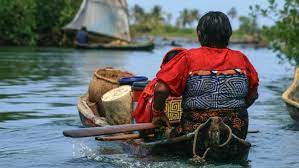The Active Role of Indigenous Peoples in Facing Sustainable Development Peran Aktif Masyarakat Hukum Adat dalam Menghadapi Pembangunan Berkelanjutan
Main Article Content
Abstract
Indigenous peoples in Indonesia have long played a significant role in the preservation of biodiversity, cultural heritage, and sustainable resource management. As Indonesia navigates the challenges of sustainable development, the active involvement of indigenous communities is crucial in achieving the nation’s development goals while preserving environmental integrity. This paper explores the role of indigenous peoples in Indonesia in promoting sustainable development, focusing on their traditional knowledge systems, practices, and deep connection to the land. Indigenous communities often possess invaluable knowledge regarding local ecosystems, which has been passed down through generations. This knowledge is key to sustainable agriculture, forest management, and conservation practices that align with Indonesia’s sustainable development agenda. However, the role of indigenous peoples is often undermined by modern development policies that fail to recognize their rights, land claims, and cultural significance. These policies frequently lead to land dispossession, environmental degradation, and loss of traditional knowledge. This paper examines how indigenous communities, despite facing these challenges, continue to resist marginalization and contribute to the sustainability of their environments and cultures. By integrating indigenous knowledge into contemporary sustainability efforts, there is potential to create more inclusive and effective development strategies. The research highlights the importance of legal recognition, cultural respect, and participatory governance to ensure that indigenous peoples can actively engage in shaping sustainable development policies. In conclusion, the active role of indigenous peoples is essential for achieving a more sustainable and equitable future in Indonesia.
Article Details

This work is licensed under a Creative Commons Attribution-NonCommercial-ShareAlike 4.0 International License.
The Authors(s) retain copyrights of the Article published on Semarang State University Undergraduate Law and Society Review. However, before publishing, it is required to obtain written confirmation from Author(s) in order to ensure the originality (Author Statement of Originality). The statement is to be signed by at least one of the authors who have obtained the assent of the co-author(s) where applicable. This work licensed under a Creative Commons Attribution-NonCommercial-ShareAlike 4.0 International (CC BY-NC-SA 4.0).
References
Kabar Latuharhary. 2021. Masyarakat Hukum Adat Wajib Dilindungi Dalam Peraturan Perundang undangan https://www.komnasham.go.id/index.php/news/2021/8/5/1861/masyarakat-hukum-adat-wajib-dilindungi-dalam-peraturan-perundang-undangan.html
Matuankotta, Jenni Kristiana. 2019. Peran Aktif Masyarakat Adat Dalam Pembangunan Ekonomi. Volume 24 Juli-Desember 2018 hal 101-113. https://media.neliti.com/media/publications/316018-peran-aktif-masyarakat-hukum-adat-dalam-26e7b3ff.pdf
Soepomo , Bab-Bab Tentang Hukum Adat. Jakarta: Pradnya Paramita. Soekanto, Soejono. (2012). Hukum Adat Indonesia, Jakarta: Rajawali Press.
